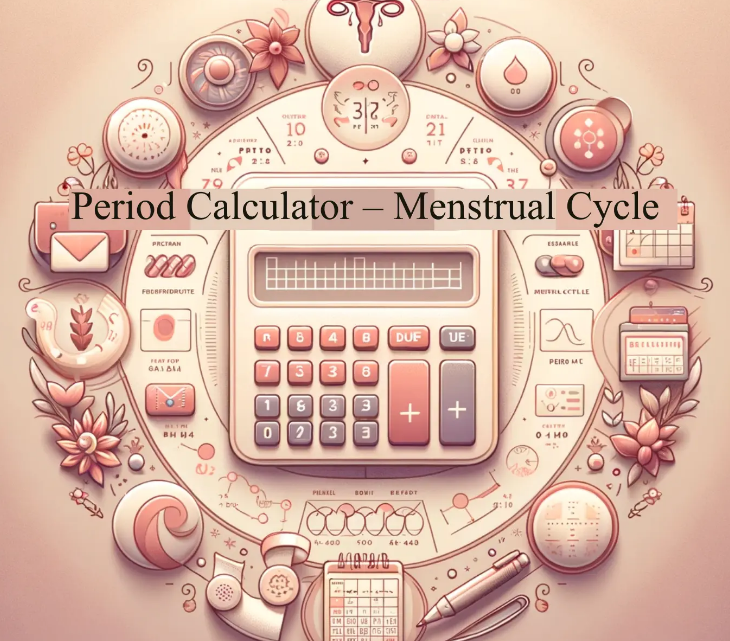Ovulation Uncovered: Navigating the World of Menstrual Cycle Calculators
 Menstrual cycle (next period) calculator can help you pinpoint when your next period is due based on your 28 day cycle length, making this an invaluable tool to assist with basal temperature tracking or purchasing ovulation kits.
Menstrual cycle (next period) calculator can help you pinpoint when your next period is due based on your 28 day cycle length, making this an invaluable tool to assist with basal temperature tracking or purchasing ovulation kits.
Menstrual cycle (next period) calculator can estimate your period based on information that you provide, such as the first day of your last menstrual period and average length of menstruation cycles. They can also help identify fertile window days and safe period days; but remember, accuracy depends on regularity in menstruation cycles; if they become irregular frequently then seek medical advice immediately.
Estimates your next period date
Menstruation is a natural cycle that helps women prepare for possible pregnancy while relieving premenstrual symptoms such as cramps, mood swings and breast tenderness. While some women have regular menstrual cycles, others may experience more irregular periods as they transition into adolescence or approach the perimenopause stage; additionally, certain health conditions such as thyroid disorders or polycystic ovary syndrome (PCOS) may cause their periods to change more frequently than expected.
If your period is late, it’s essential that you understand its cause and the appropriate steps to address menstrual cycle irregularity. High levels of stress may disrupt hormone balance and contribute to late periods. Missed periods could also be an early indicator of pregnancy so taking a pregnancy test if sexually active may also help.
An unexpected late period can be distressing, but it doesn’t necessarily indicate anything wrong. Menstrual cycles generally last 28 days but can vary anywhere between 21-35 days; using a menstrual cycle calendar and app you can track when your next period will likely arrive and track its development over time.
MomJunction period calculator takes into account your LMP (Last Menstrual Period) date and average cycle length to accurately predict when your next period will come due. Fertile Days and Ovulation day dates can also be displayed, helping plan vacations or events without periods. Simply visit their website and login with your Flo account! To get started!
Predicts fertile windows
Women looking to conceive can increase their chances of pregnancy by understanding their fertile windows – these are days during the menstrual cycle when sperm can successfully fertilize an egg, leading to its development into a healthy baby. While fertile windows vary according to each woman, using an ovulation calculator will allow you to track these periods and understand your individual fertility more thoroughly.
An ovulation calculator helps predict when your next period is due by counting how many days remain in your luteal phase – the portion of your menstrual cycle that begins after you ovulate and ends just before bleeding begins. An ovulation calculator uses traditional calendar methods as well as any data entered into an ovulation calendar, giving more accurate predictions as more data is entered in each month.
Experience has shown that having sex during the fertile window increases your chance of pregnancy. Generally, it’s best to engage in sexual activity during the five days leading up to and including ovulation as this allows sperm the best chance of fertilizing an egg already present; however, sperm may live for 48 hours after ovulation!
Fertile windows may be difficult to determine for women with irregular menstrual cycles. Luckily, there are numerous apps that can assist you in finding your fertile window and planning for pregnancy. These apps will give you an estimated date for your next period based on factors like your average cycle length and previous cycles; then they notify when and how likely it is that you ovulate, as well as two of the two most fertile days during your cycle.
Remember, these tools are estimates and that actual ovulation will differ for each woman. While apps like OvaCare can provide useful information, they should never be used as birth control methods – always consult a physician prior to initiating any reproductive health routines.
Tracks your cycle over time
Menstrual cycles are natural physiological processes in women’s bodies, yet can provide insight into her overall health. By tracking her menstrual cycle over time, a woman can identify any irregularities in her body’s functioning – including when and what signs to look out for prior to their period starting – giving her better preparation and the chance to make informed decisions regarding her wellbeing.
Many women experience irregular menstrual cycles. Although these irregular cycles may be normal for some reasons, they can also be signs of hormonal imbalance, stress or diet-induced lifestyle changes and require medical intervention, particularly among young teenagers and perimenopausal women.
Menstrual cycles for most women last 28 days on average; however, this period can range anywhere between 21 to 35 days. To properly understand and predict when ovulation will occur, it is crucial that women track their menstrual cycle over several months using an online menstrual cycle calculator.
Apps designed to predict bleeding can provide only limited information; most apps however offer much more comprehensive data by monitoring basal body temperature, cervical fluid levels, symptoms such as pelvic pain and even offering visual calendars to display current and past periods.
These tools can also be useful for couples hoping to conceive who wish to know when their fertile window opens and closes, helping them plan their intercourse around it. However, it should be remembered that predictions regarding when ovulation will occur can sometimes be inaccurate as its exact date can differ due to delays or earlier or later than anticipated ovulation dates.
Apple’s new app called the Flo app provides an accurate and personalized way of tracking menstrual cycles and predicting ovulation more precisely and precisely than before. Compatible devices include iPhone, iPad and Apple Watch Series 1+ running iOS 13, iPad OS 17 or higher or watchOS 6. You can access Flo in Health on iPhone and Cycle Tracking on Apple Watch respectively.
Helps you prepare for premenstrual symptoms
Tracking your menstrual cycle can help you understand what’s typical for you and may reveal clues as to why your period may be irregular. For instance, you might notice patterns like longer or shorter than expected periods, changes in quality (dry vs sticky), as well as any premenstrual symptoms like cramps, bloating and fatigue in advance. Furthermore, keeping track of when your ovulation window opens could play an instrumental role in getting pregnant or maintaining it.
Menstrual calculators can help predict when your period will arrive or just let you know when ovulation and fertile windows occur, providing accurate predictions that can assist with trying for a baby or knowing when your period will arrive. Unfortunately, however, some apps make mistakes and it can be hard to ascertain their accuracy.
To assess the accuracy of these apps, we conducted an in-depth analysis on actual period data collected from five “average” women. To measure how well these apps worked, we compared predicted period dates and ovulation days with actual cycle length to see how well they predicted periods and ovulation days. Data for each app was collected during cycles 6, 7, and 8. Predictions ranged from 2-8 days off average across all apps; we then ranked each app according to how far off their predictions were.
App 1 was the best app, ranging between one to two days off average on average; apps 3, 5 and 9 had two to three day discrepancies each respectively, meaning even when using an app it is important to consult your health care provider in order to confirm ovulation and fertile windows.
Remember that period calculators should not be seen as contraceptives or replacements for birth control methods such as hormonal birth control. Without being able to ovulate and get pregnant, using hormonal birth control methods means other ways must be found of identifying when it’s time for your period to start again.
Period calculators can be frustrating when they’re inaccurate, while others find them empowering as it increases awareness of their menstrual cycle and can then share that knowledge with healthcare providers.
